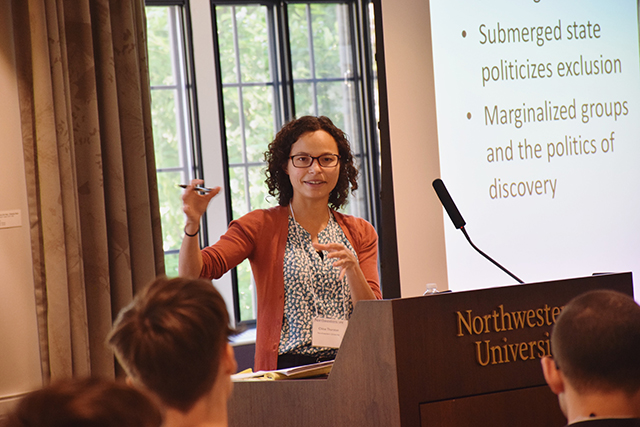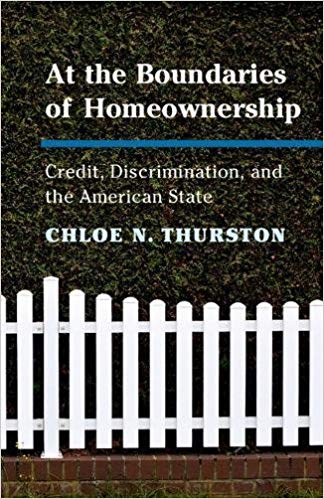Locked Out of Homeownership
IPR associate Chloe Thurston explains how government has helped/hurt homeownership
Get all our news

IPR political scientist Chloe Thurston discussed how government policies have affected homeownership in the United States at the 2017 Chicago Political and Social Behavior Workshop.
Tracing how government policies have opened the door to a home for many Americans, IPR political scientist Chloe Thurston also shows how the same programs often served to lock women and minorities out of home ownership.
Her book, At the Boundaries of Homeownership: Credit, Discrimination, and the American State (Cambridge University Press, 2018), uncovers a surprisingly indirect but “substantial social policy system” in the United States when it comes to U.S. homeownership.
Thurston’s investigation begins with the creation of two critical pieces of government housing policy: the Federal Housing Administration (FHA) following the Great Depression and the GI Bill following World War II.

“Both made it possible for millions of millions of households to become homeowners at terms that were suddenly very affordable for them,” Thurston said.
Before the FHA or GI Bill, home buyers typically had to put 50 percent down and repay their loan in between two and 12 years. Afterward, they only had to put 20–30 percent down and could pay off mortgages over 30 years.
“It made buying a house comparable to renting—at least in terms of the monthly costs,” Thurston explained.
The two programs accomplished this through federal insurance of the loans made by private lenders, provided the lenders offered loans on terms affordable to middle-class Americans. But this also placed the government in the position of needing to develop criteria to distinguish safe borrowers and properties from risky ones, lest the government find itself exposed to default risk.
Lenders at the time believed that houses in racially diverse neighborhoods, and those with the potential to become racially diverse, were riskier investments due to more volatile housing values. Government mortgage underwriters viewed restrictive covenants as one way for neighborhoods to retain their housing values and promoted their use accordingly. These legal clauses in deeds prevented owners from selling their house to racial and religious minorities.
“If everyone in the neighborhood had that language attached to their deed, they could protect the neighborhood against—as the federal government called it—the encroachment of adverse influences,” Thurston said. “This was a discriminatory housing market, shaped to an extent by the federal government.”
Women also had difficulty obtaining loans. Job security was one factor lenders looked at when evaluating creditworthiness. In the 1960s and '70s, lenders assumed that women’s incomes were temporary—despite data showing that women worked to contribute to their household income.
Citizens' organizations began to mobilize to challenge their exclusion from government-supported mortgages. Advocacy groups such as the NAACP fought back against discriminatory policies, winning a Supreme Court case against restrictive covenants, as well as getting the FHA to remove explicit racial references from its manual.
Organizations like the National Organization of Women and the Women’s Equity Action League focused on sex discrimination by lenders. These groups collaborated with women’s magazines to raise awareness of lending discrimination, conducted surveys to prove it occurred, and testified before lawmakers.
Though Thurston examined historical case studies for her book, she notes that the federal government still plays an important role in setting the criteria for who should be considered safe or risky to lend to. She highlighted how some senators have been pushing to expand the types of credit information used to determine mortgage eligibility.
“If someone pays their rent on time and has never been late, they should be considered a pretty safe bet,” Thurston said. “But those types of things don’t necessarily show up in a credit score. We might be missing all these people [who] are safe bets but nonetheless can’t get a mortgage.”
Chloe Thurston is assistant professor of political science and an IPR fellow.
Published: July 31, 2018.